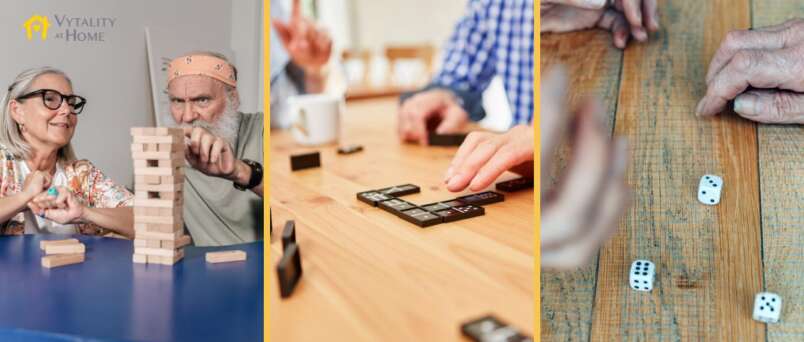Not just cards: enjoyable games for seniors with limited mobility
When we can’t move around as well as we would like to, we may find ourselves spending considerably more time just sitting at home because it’s more comfortable, less tiring and (at this time of year) warmer too.
However that doesn’t mean we can’t be active! One of the way to keep your upper body moving AND your brain alert is to play games that combine both physical and mental elements. The classic example of this is chess, where you need to have a mental strategy to outmanoeuvre your opponent, and also physically move your chess pieces around the board.
Chess is a challenging game in that there are certain rules to remember, but no game is ever the same. According to the Shannon Number calculation, there are:
“Even more possible variations of chess games than there are atoms in the observable universe.”
Chess moves
The action of moving your chess pieces involves subtle but involves muscle movements such as:
- Leaning forward to the board
- Lifting your arm over the board to your advancing pawn (or whatever)
- Physically gripping a piece to lift it into its new position
- Sitting back to watch how the other player responds
That may not seem a lot, but you will be doing it multiple times during a game. Contrast that with the relatively static position when reading a book or newspaper for a time, and you can see how even gentle movements will add up to a greater whole.
Classic games with straightforward rules
Older seniors may prefer a game with less rules, that allows it to be played more quickly and with almost anyone (such as your Vytality caregiver!). Here are some classic board games with limited number of rules and a faster gameplay, that also include that all-important physical factor.
- Dominos
- Checkers / draughts
- Backgammon
- Mahjong
All of these games involve handling gaming pieces/tokens and dice. Many players prefer games made from natural wood that feels good in the hand and lasts a long time too.
If you have difficulty picking up small objects due to arthritis or similar, choose a version with larger pieces that you can handle more easily. You can also use a pair of dice poppers, which roll the dice for you with a satisfying pop (and keep them on the table too!).
Caring for a senior with memory loss or cognitive decline?
Check out our popular article on “15 stimulating sensory activities for seniors with dementia or Alzheimer’s”
Not just jigsaws: colours and shape matching
Jigsaws are a favourite with many seniors, but they can take up a lot of time and space to complete. Depending on the piece sizes, they can be fiddly too and for seniors with full mental capacity, once it’s done, it’s done!
One of our team is a big fan of Blokus. There’s just one rule: get rid of all your pieces. Oh, and stop the other players using all theirs too! Classic Blokus is best with four players but Blokus Duo is designed just for two.
A pain in the neck?
All the above games tend to involve looking down at a board. For a change of neck position (!), consider a vertical game such as:
- Connect 4
- Battleships
- Kerplunk!
No right answer
Games don’t have to be competitive. Playing cards can be used to create card houses, and games such as Jenga can be played solo.
Many also like puzzles that are creative, where the end game is simply to create a new shape each time. One of our team’s favourite is balancing toys, where the aim is to balance wooden figures in shapes that defy gravity. Look for wooden versions as pieces are tactile and substantial, especially suitable for stiffer hands. These balancing whales are delightful – so clever!
No time to enjoy a game or chat with your current home caregiver?
Discover the Vytality at Home difference, with our 2 hour visits allowing plenty of time for the ‘necessaries’, a chat, and a game or two while the laundry is on!




